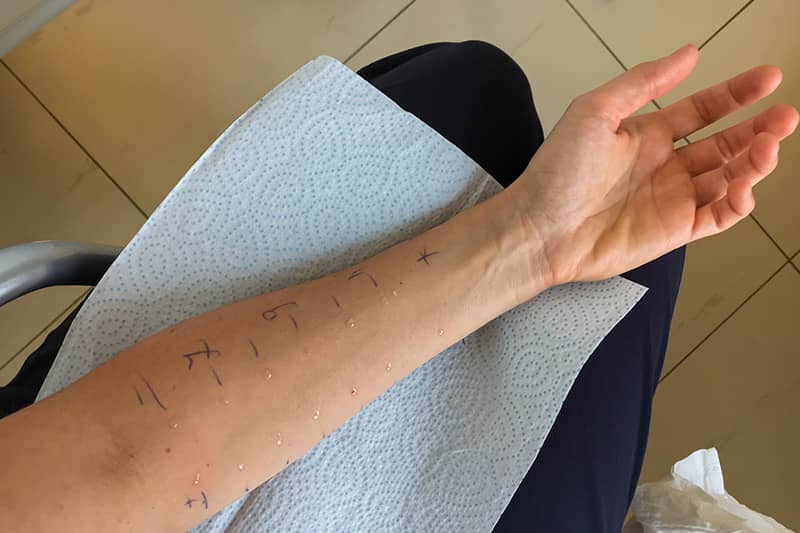Having allergies can mean a lot more than just sneezing in the spring. Severe seasonal, food and medication, or environmental allergies can take a toll on your life in many different ways. Working with an allergy doctor who can help you find out exactly what you are allergic to and how to reduce your reactions is critical to allowing your whole immune system to function more effectively. The immunology professionals at Penn Medicine Becker ENT & Allergy in Mullica Hill, NJ, can help you improve your response to allergens and maintain your focus and energy.
What Is An Immunologist?
An immunologist studies how the body responds to potential threats. Because an allergy is an inappropriate immune response to a substance that is not actually a threat, working with an immunology professional is key to getting the best possible control over your allergic responses.
For example, inhaling a virus or ingesting harmful bacteria generates an immune response. This response is appropriate and necessary as these pathogens will replicate and cause harm. This adaptive response benefits us long-term in the case of viruses. There are many illnesses that your body remembers and knows how to destroy once you have had it once.
However, an allergic response can also be adaptive, and this is when allergies are at their most dangerous. A simple allergic response can quickly become a dangerous one. Allergy-induced asthma, for example, is often an indicator that an allergic response has grown dangerously extreme.

What Does an Immunologist Test?
To determine the source of your allergic reactions, your immunologist will need to determine what you are reacting to, your level of exposure, and the reason for the severity of your response.
During your appointment, you may be asked to demonstrate lung function. You may also need to have blood drawn to check allergen levels in your blood. Other tests could include:
- A patch test, or topical patch containing the possible allergens
- A skin or “scratch” test, which punctures the skin and places the allergen on the pinprick
- A nasal smear or swab inside the nose
All of these tests will give your allergy doctor the necessary information to help determine the best course of treatment in your specific case.
What Progression Will My Treatment Follow?
Each treatment plan is as unique as the allergy sufferer. However, if your allergies are severe enough to put you at risk of anaphylactic shock or an asthmatic response, your treatment progression may start with medication and avoidance, and might include a prescription for an EpiPen.
How Should I Prepare for My Consultation With My Allergist?
Bring a list of all the medications you are currently taking, as well as any you may have stopped using. Do be aware that you may need to undergo a patch test or a scratch test during your visit. Be sure you have comfortable clothing that you can wear over irritated skin should the need arise, and be prepared to have blood drawn.
If you have not already started one, consider keeping a journal of your allergic responses and try to track the days, your activity on those days, what you ate, and how you felt overall. Many times, allergy sufferers notice a pattern between what they eat and the severity of their reaction, even if their allergies are related to their breathing and not their digestive tract.
Why Work With the Immunology Professionals at Penn Medicine Becker ENT & Allergy in Mullica Hill?

The team at Penn Medicine Becker ENT & Allergy can help with more than just allergies. Because severe allergic responses over time can cause tissue damage to the nose, throat, and ears, having ENT expertise on your side can help you overcome challenges you have simply dealt with forever.
As you come to understand and better control your allergies, you may also be able to get help for any:
- Sleep apnea
- Snoring
- Tinnitus
- Hearing loss
- Visible tissue damage, such as inflammation around your eyes
Allergies, over time, can do much more than make you sneeze. Conditions such as chronic rhinitis can lead to swollen, puffy eyes, a constant scratchy throat and tired voice, a swollen nose, and even swollen lips. With the right doctors, you can enjoy looking better, feeling better, and breathing better.
Allergist FAQs
Your chances of seeing improvement are very good! Over time, your body sees the substance that is triggering your allergies as a bigger and bigger threat. If you are taking over-the-counter medications to suppress your entire immune system to prevent a miserable response, it makes sense that your immune system is working harder to do what it thinks is right.
Your immunologist in Mullica Hill will start by determining exactly which allergens you are responding to. Once that is known, the immunology team can help you to target and tailor your medications and other treatment options to avoid the need to overload on over-the-counter medications.
You may not need to keep a food journal, or it may not be a long-term project. However, this tool is a good way to build awareness of any connections between what you eat and how your immune system reacts to stimuli.
Your immunologist can guide you on the benefits of tracking and you can determine if it is worth the effort in your situation. Do remember that tracking is not about changing anything. It is just for awareness.
Food tracking is also a wonderful way to confirm that what you are currently doing is what is best for your body. You may also learn that seasonal allergy challenges can be lessened by reducing your exposure to certain foods and seasonings when the offending plant is in bloom.
Red eyes are a strong indicator that you are suffering from rhinitis, or a severe inflammation of the sinus cavity. If your allergies are severe enough to trigger a reaction that turns chronic, you may well struggle with chronic red eyes, swelling above and below the eye, and chronic pain or itching.
Severely inflamed sinuses can impact many things, including:
• Your ability to taste and smell
• The quality of your sleep
• Whether or not you can hear at certain frequencies
• Your confidence in your appearance
You may be able to get rid of a problem that has long plagued you. If you are considering a cosmetic procedure to address the puffiness around your eyes and have long struggled with allergies, talk to an immunologist first to make sure that this inflammation is not related to chronic rhinitis. Even if you choose to go ahead with that procedure, you can be sure that you are heading into surgery in the best health possible.
Find Our Office in Mullica Hill, NJ
To visit our office at 199 Mullica Hill Rd, Mullica Hill, NJ 08062
From Woodbury (North):
- Take NJ-45 S/Mantua Pike
- Turn left onto Cedar Rd
- Turn right onto Walters Rd
- Turn left onto US-322 E
- Turn right onto Mullica Hill Rd
- The office will be on your right
From Vineland (South):
- Take NJ-55 N
- Take exit 50 B to merge onto US-322 W/Mullica Hill Rd
- Continue onto Mullica Hill Rd
- The office will be on your right
Schedule Your Appointment
By getting control of your allergy symptoms with comprehensive care from the professionals at Penn Medicine Becker ENT & Allergy in Mullica Hill, NJ, you can better manage every facet of your life, from your schedule to your overall comfort. We look forward to being your immunology professionals. Call our office or visit us online to schedule an appointment.

